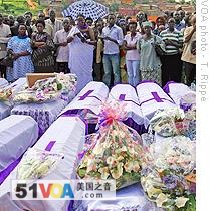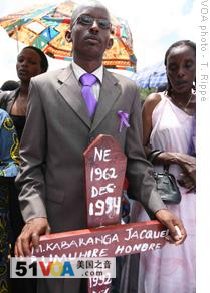Kigali, Rwanda
10 April 2009
 |
| Rwandans continue to bury victims of the 1994 genocide that left 800,000 dead |
For many families the wounds are still fresh, and the healing process incomplete. Many Rwandans have never found the remains of family who were killed at that time. "I think survivors who have never discovered the bodies of their relatives are always living with that kind of sadness internally, because they have never discovered their relatives. So it's a chance for these ones to discover them and bury them in a dignified area," said Honore Gatera, who works at the Kigali Memorial Center, where more than 250,000 genocide victims are buried. He himself lost more than 20 family members to the genocide, and he understands the need of people to bury their families with dignity.
Gatera says every year about 1,000 bodies are brought to the center for burial. Some were buried in family compounds, but many families bring bodies to be buried here because in Kigali's rapid development many homes are being removed to make room for new construction.
Alphonsine Murebwayire, who works for the Kicukiro district of Kigali, where most of those being buried today are from, says it's important to bring the bodies here to the center. "Those who were killed during the 1994 genocide, they were scattered everywhere. Today we are reburying the bodies, and we have bury them in a site which is important, which is a good site," she said.
 |
| William Muvandimwe, who lost his wife, Jacqueline, in the Rwandan genocide, moved her remains from his home to the Kigali Memorial Center, 10 Apr 2009 |
Peter Sankara is a businessman from Kicukiro. He knows almost all of the one hundred and fifty people being buried here, his friends, family and neighbors. He says finding the remains of the victims can bring the community together. "After 15 years just one person comes up and says I know where so and so is. I know where your mom is. I know where your brother is buried. When people come up and say we know where so and so is it's a signal to us that the reconciliation, the coming together of Hutu, Tutsi kind of business is really in progress and we are really happy with it," she said.
Rwanda continues to struggle to find a balance between remembering the past and moving to the future. These burials help Rwandans to do both. It's a day both of mourning, and of hope.